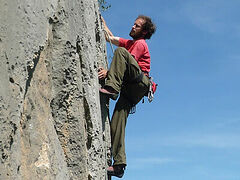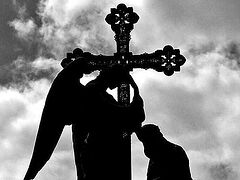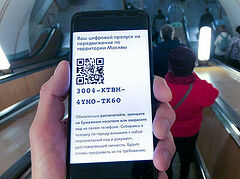We have just read the Gospel narrative about the Savior healing the woman who was bent over, having suffered from this infirmity for eighteen years. This healing was wrought by Jesus’ word and His laying on of hands upon the infirm woman (Lk. 13:10-17).
Reading this narrative about the Savior’s healing of the bent, or hunched woman, I’m reminded, my brethren, of the penitential prayer of Manasseh, king of Judah, in which he, confessing his iniquities to God, likens them to iron bonds that have bent him over so severely that he can’t lift up his head: I am bowed down with many iron bands, that I cannot lift up mine head (Prayer of Manasseh). And indeed, the infirm woman mentioned in today’s Gospel reading represents the whole of mankind bound with sin, meaning you and me, my brethren. The Savior, having healed the woman of her infirmity, is also our Savior, Who daily frees us from the bonds of sin. Ah, who among us has not and does not daily experience that our sins and the enemy of mankind cripple our souls, if not our bodies, preventing the soul from freely gazing toward its Heavenly homeland, but forcefully inclining it toward the earth, binding, and even seemingly nailing it to earthly goods and pleasures!
Thus, the infirm woman, healed by the Savior, indicates our soul, crippled by sin and the devil. And what would have become of our souls had Jesus Christ not come to earth to save mankind from the violence of the devil and the passions; what would have happened were He not constantly saving us, loosing the bonds of sin? We’d all be like this infirm woman, bound by many iron fetters, and like animals, would all be crawling upon the earth, looking only at the ground, never looking to our Heavenly homeland; and we would have no lofty, Heavenly thoughts, desires, and aspirations, but would only drown in vain earthly concerns and affairs.
What am I saying? Are there not even now those among Christians who do not have the Spirit of Christ, people whose thoughts and aspirations, words and deeds are only earthly? There are, and how many! Who are they? All those who rave and bustle about earthly happiness, about abundance of money, about fashionable clothes, about the magnificent decoration of temporary dwellings, about diverse and beautiful dishes, about formal dinners, evening parties, feasts, about card games, about dancing, about theater, about various pleasures and vain pastimes. Do you not see that all these and similar people are like this bent over woman mentioned in the Gospel in that they don’t look toward Heaven, they look only at the earth, like animals, as though they weren’t made according to God’s image; as though the earth were their permanent homeland; as though they’d never even heard of the Heavenly homeland; as though they weren’t called to it by the Gospel, the Church, Jesus Christ and the Apostles; as though they were created only to get dressed up, to kill time in idle talk, in games, in laughter, or in acquiring wealth?
But these people are infirm by their own will, by whim, by passion, which means they themselves are guilty and inexcusable in their infirmity. And the crippled woman mentioned in the Bible was deformed physically, although, perhaps, for a spiritual sin—meaning she deserved pity for her infirmity. She couldn’t free herself from her infirmity, she couldn’t straighten up and look directly at Heaven. But the infirm among us, or rather all of us, can by the grace of God free ourselves from the crookedness of the passions and lusts, stand straight on the path of Christ’s commandments, and see Heaven. We can abandon earthly, worldly attachments, and love with all our hearts the Lord God Who created us according to His image and likeness, and our neighbor, especially his soul, as ourselves, and the city of Jerusalem on high.
My brethren! Why did the Lord God create us with an upright posture, with heads raised upward, not bent down to the ground like animals? So that we may gaze unceasingly at Heaven, as beings created for Heaven, so that we may strive toward Heaven. Is it natural for the human body to be hunched and bent toward the earth, unable to stand straight? No, it’s painful, unnatural. Understand why this is being said.
Furthermore, in this Gospel narrative, our attention is drawn to the hypocrisy of the synagogue leader, who was indignant at the Lord for healing the infirm woman on the Sabbath, as if it were sinful to do good deeds on the Sabbath or to perform necessary daily tasks that can’t be put off, such as watering a horse, ox, or donkey, and so on. The hypocritical ruler of the synagogue didn’t consider it a sin to envy the Divine Wonderworker, His miracles, and the woman who received His blessing, but considered it a sin to do good on the Sabbath.
So too today, many Christians consider it a sin to do something on a feast, such as some necessary work, but don’t consider it a sin to envy their neighbor, to harbor hostility, to seek revenge, to drink to drunkenness, to sing inappropriate songs, to spend time in distraction, in gambling for profit, in reading empty books, in idle talk, in jesting, in foul language! Or they consider it a sin to eat, even due to bodily weakness, non-fasting food on a fast day, yet they despise or judge their neighbor, their acquaintances, or they offend or deceive others, give false weights and measures, or indulge in carnal impurity without any pangs of conscience.
O hypocrisy, hypocrisy! O failure to understand the spirit of Christ, the spirit of Christian faith! Does not our Lord God first and foremost require inner purity, meekness, and humility from us? Should we not first clean the inside of cups and dishes, so that the outside may be clean? Is not external fasting given in order to aid inner virtue? Why then do we pervert the Divine order? Oh, let us hate hypocrisy and cleanse ourselves from all filthiness of the flesh and spirit, perfecting holiness in the fear of God (2 Cor. 7:1).
Amen.




